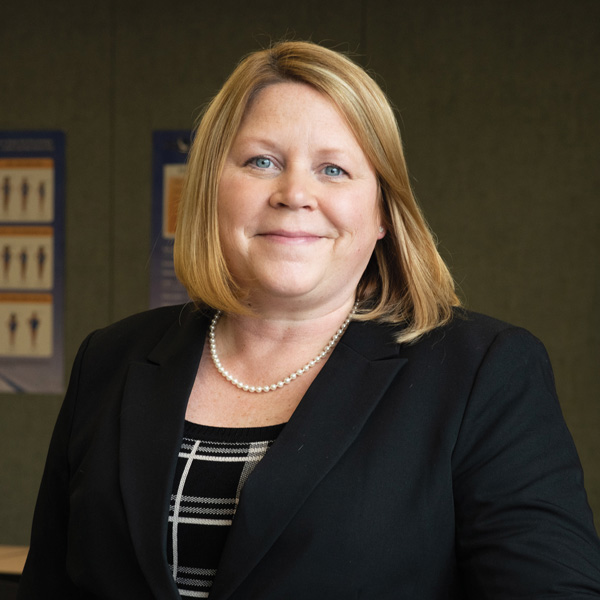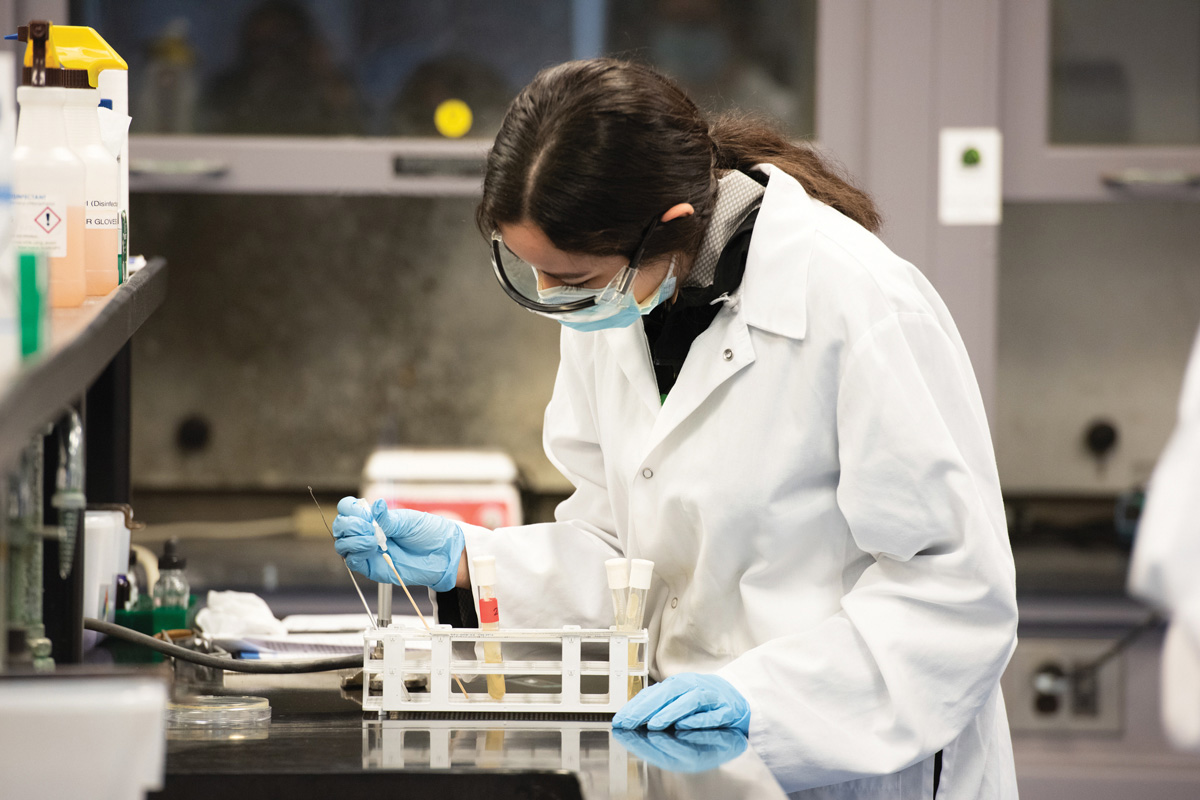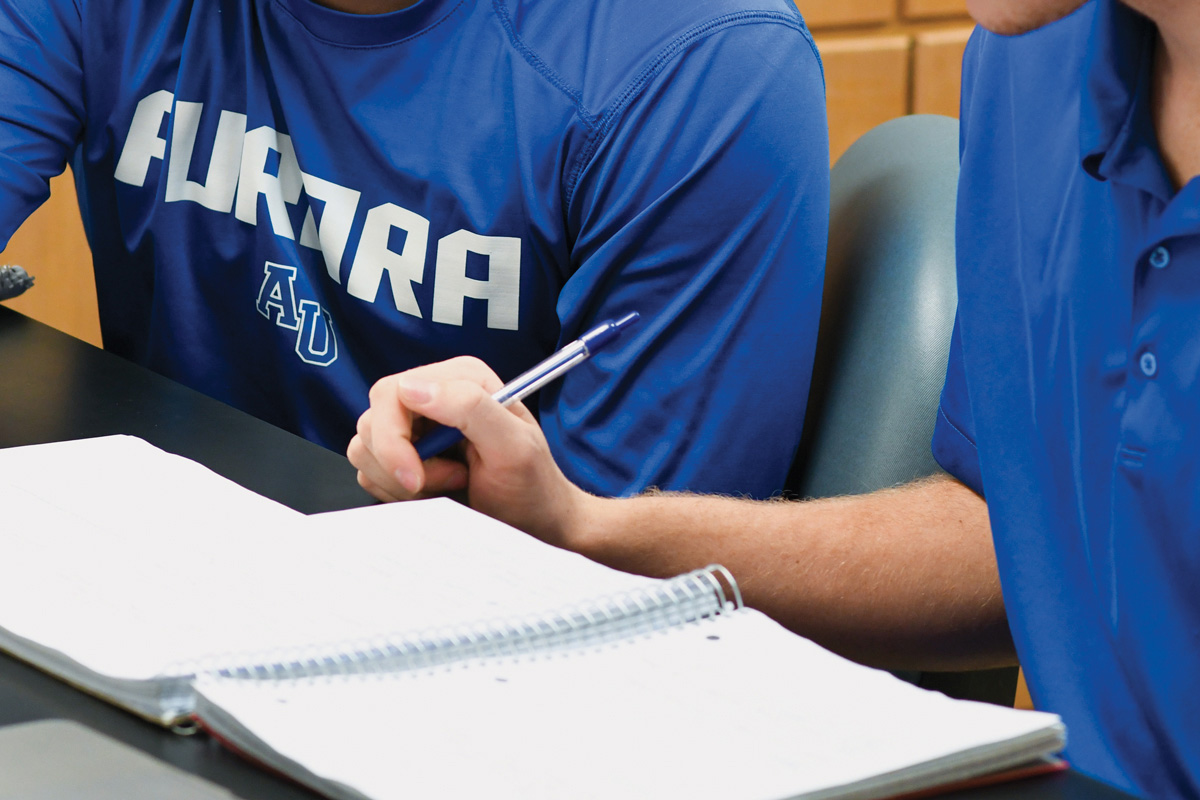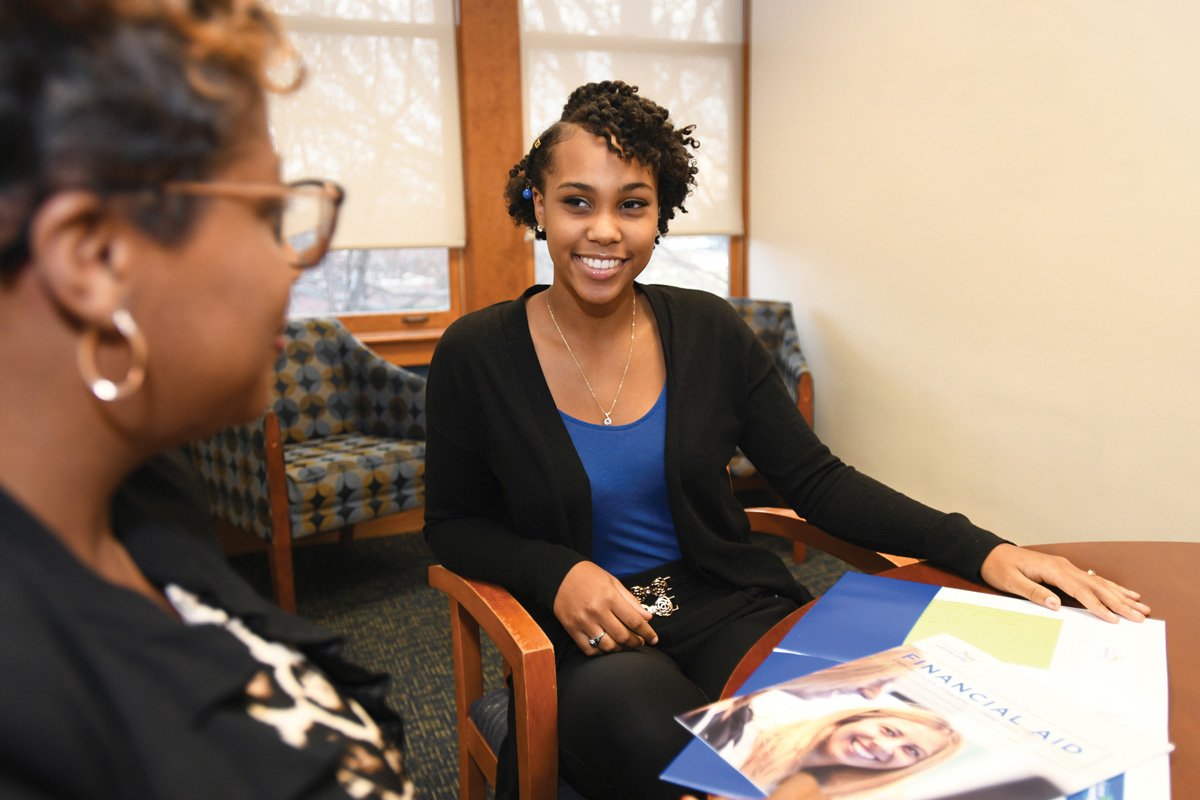Rising Above: The Path to 2024
AU’s new strategic plan looks to the future and finds opportunities for growth
Standing outside Eckhart Hall, looking across the Quad to the bronze Spartan statue poised at the entrance of Alumni Hall in the distance, it is impossible not to experience the resilience and strength of Aurora University.
Since its founding, AU has striven to be an exemplary institution of higher learning, standing apart from other colleges and universities by putting the focus on affordability, accessibility, and authenticity.
It is with this legacy in mind that AU has unveiled its new strategic plan, Rising Above. The five-year strategic plan, approved by the Board of Trustees in November, charts an ambitious path through 2024. True to AU’s mission, the plan is designed to emphasize first and foremost its students — supporting them not only in the classroom, but across mind, body, and spirit.
The theme of Rising Above calls not only for AU to rise above the upheaval facing higher education, but for students to rise above prevailing circumstances and personal challenges to fulfill their aspirations. The plan builds on AU’s legacy of rising above the exigencies and orthodoxies of a complicated world, to fulfill the university’s mission with confidence for decades to come.
Higher education is evolving in dramatic and often unpredictable ways. The global pandemic, its economic fallout, and widespread social unrest have accelerated the seismic shift already underway in how America addresses the education and training of its young people for life, work, and community. Public confidence and trust in higher education, once quite high, have declined in recent years. Critics of higher education are especially vocal about high tuition costs and concomitant levels of student debt. Although AU operates with a high degree of integrity and transparency, the industrywide problems are putting pressure on all universities.
AU is responding with agile and nimble adjustments to meet the changing marketplace and the evolving needs of students. The university’s distinctive business model blends a remarkably low private-college tuition price with a generous aid philosophy, thoughtful stewardship, and demonstrated excellence to provide a truly exceptional value. This value proposition — along with longstanding commitments to scholarship, character, citizenship, social responsibility, and spiritual growth — distinguishes AU from other higher-education institutions.
“This is a moment that calls us to something higher,” said AU President Rebecca L. Sherrick. “We can choose a different path.”
In the years ahead, the university will continue to build upon these strengths while welcoming new populations of undergraduate and graduate students to AU’s campuses, enrollment centers, and growing online program.
AU has plans to launch the Aurora campus autism initiative this summer, expand the Plus One accelerated graduate degree programs, diversify online offerings, increase summer learning opportunities, and continue to make investments in technology infrastructure.
What follows is a closer look at a few of the many initiatives underway as part of the Rising Above strategic plan that are shaping AU for the years ahead.
Training for Jobs of the Future: The New School of Health Science
One of the boldest initiatives set forth in the new strategic plan is the establishment of a School of Health Science.
The healthcare field is the largest source of jobs in the U.S. and ranks among the fastest growing professions. An estimated 2.4 million jobs in healthcare are expected to be created by 2029, an uptick of 15% since the start of the decade, according to the U.S. Bureau of Labor Statistics.

“We want to prepare students to be leaders in the health fields and to bring positive changes to the healthcare industry and to society as a whole,” said Sarah Radtke, dean of the School of Health Science. “This past year of the pandemic crisis has exposed all the problems in healthcare. We knew they were there, but we could see how the system broke down under the extreme stress of the pandemic.”
The new school, launched in January, is a natural outgrowth of AU’s strong foundation in the helping and healing professions. The university has been training nurses since the end of World War II and social workers since the Great Depression. The School of Nursing and the School of Social Work are among the most highly regarded programs of their kind in Illinois.
The School of Health Science likewise follows AU’s practice of sending well-educated and highly trained graduates into the world to improve the lives of individuals and the community with compassion, integrity, and inclusivity. For the past 20 years, AU has excelled in preparing students for careers in athletic training, exercise science, human-animal studies, and therapeutic recreation.
The pre-veterinary track has an unmatched record in training students for acceptance into veterinary schools. And AU alumni in the fields of biology and health science are working across Illinois and the U.S. as physicians, pharmacists, biomedical engineers, and research scientists.
The School of Health Science houses four undergraduate majors, three graduate programs, and nine pre-health profession tracks from AU’s current programs and expands upon them with new courses and programs.
We are intentionally focused on introducing students to the complexities of the healthcare industry and all the job possibilities within it.Sarah Radtke, Dean of the School of Health Science
A rigorous new constellation of courses is under development for continued study in professional fields ranging from medicine and dentistry to physical therapy and public health. Exciting new classes in community health, healthcare informatics, and evidence-based healthcare will be offered for the first time this fall. And a new Healthcare Administration program is on the horizon.
New curriculum will introduce students to the fields of healthcare, healthcare ethics, and healthcare technology, including electronic record-keeping systems, and address the cultural issues related to providing healthcare.
“After a review of the top health science programs in the country, we expanded our focus on public health, with an eye toward developing really well-rounded healthcare practitioners,” said Radtke, who built the Exercise Science and Athletic Training programs at AU before being named dean of the School of Health Science.
To further support students, the School of Health Science is in the process of hiring new faculty with extensive experience working in the field as medical doctors, exercise physiologists, and athletic trainers. The school has a pre-medical advisor dedicated to helping students interested in pre-health professions to navigate the ever-expanding array of healthcare careers, as well as to demystify the professional-school application process.

- New classes in community health, technology, culture, and ethics
- Dedicated premed advisor
- New faculty hires with work experience in healthcare
- Pipeline agreements with medical schools
- New Health Care Administration major
“Most students enter college with limited knowledge of the diversity of jobs available in healthcare,” said Radtke. “We are intentionally focused on introducing students to the complexities of the healthcare industry and all the job possibilities within it.”
AU leaders are working to develop pipeline agreements with medical schools and expand partnerships with local healthcare organizations that will allow AU graduates to make positive transitions into careers and advanced studies. AU’s Exercise Science and Athletic Training programs already provide students with internships and clinical experiences at local hospitals, rehabilitation centers, and medical facilities, including Advocate Health Care, Athletico Physical Therapy, ATI Physical Therapy, Fox Valley Immediate Care, Northwestern Medicine, and UChicago Medicine. Similar agreements are on track to be in place for the pre-professional health programs by the end of the year.
“We have done a lot of good things in health science already, and we are looking to build upon our successes,” said Radtke.
Improving Student Writing Across Disciplines
Clear communication is powerful. Students who write well are more likely to succeed.
No matter what the discipline, good writing reflects a student’s ability to think critically, frame arguments, and draw conclusions. That is why AU is integrating how to become a better writer into more courses and majors.
“Students’ long-term success depends in large part on their ability to communicate precisely and concisely,” said Matthew Kneller, associate professor of communication and director of general education. “It doesn’t matter what profession you go into, to be successful, you have to be able to write well.”

- New writing-intensive courses for every major
- Restructured writing assignments that measure students’ improvement
- Extra support from professors, the library, and the Academic Support Center
The university has made student writing the focus of its Higher Learning Commission Quality Initiative. AU is due for its 10-year accreditation in October 2022, and choosing a project for the HLC Quality Initiative is required as part of the accreditation process. The final outcomes report for the writing initiative will be presented to the HLC in June 2022.
Almost every academic program offered at AU is connected to a profession that is writing intensive, said Kneller, who has been working with a team of professors, administrators, and staff members to coordinate the writing initiative. Nursing, social work, and criminal justice require excellent report-writing skills. Scientific and evidence-based writing predominate in psychology, biology, health science, and sociology. Mathematics emphasizes written proofs that rely on providing evidence and drawing conclusions.
It doesn’t matter what profession you go into, to be successful, you have to be able to write well.Matthew Kneller, Associate Professor of Communication
The arts and humanities require intense reading skills and the ability to effectively argue a point. And the mastery of proper grammar, sentence construction, correct spelling, and organization apply to all modes of writing, Kneller said.
As part of the initiative, AU faculty have created significant writing assignments tailored to every major and have incorporated writing instruction into most of their classes. Beyond writing more, students are tasked with writing better. Rather than simply receiving a grade, students review, revise, rewrite, and resubmit their papers to demonstrate improvement. The faculty have developed a rubric to chart students’ development in writing across various disciplines from freshman through senior year.
“The strategic plan is designed to foster a climate of continuous improvement,” said Kneller. “One of its core values commits the institution to pursuing excellence by embracing quality as a way of community life. Improving written communication will benefit AU students for life.”
Guiding Students to Success
The heavy toll the pandemic has taken on teenagers is changing how AU plans to welcome the incoming freshman class this fall.
For almost a year and a half, most high school students have had minimal interaction with classmates. They have taken some or all of their classes remotely. Most social activities, sports competitions, pep rallies, student clubs, proms, graduation ceremonies, and other traditional high school touchstones disappeared due to COVID-19 restrictions.
AU has recognized this new reality and is adjusting student support services to fill the gap.
“We’re starting to talk about what orientation looks like for new students coming to AU,” said Jennifer Buckley, vice president for student success and dean of the School of Education. “We need to help students with basic social skills and time management, with what it means to communicate with your professors. There’s going to be a resocialization taking place at colleges everywhere as we start to rebound from the pandemic.”

- Newly constructed Kimberly and James Hill Center for Student Success
- One-on-one financial counseling for every student and family
- Sundays @ 7 Career Conversations with Alumni
- Renewed focus on ethics across disciplines
- Resocialization for students as they return from pandemic restrictions
At the heart of AU’s efforts to support students during their college journey and into their early career is the Kimberly and James Hill Center for Student Success. The newly constructed building is slated to open later this summer. It will offer students opportunities to discover their path in work and life, to prepare for employment and graduate school interviews, and to succeed after graduation.
Academic advisors and faculty members are committed to creating connections with students throughout their college experience — from registering as freshmen to choosing a major, landing an internship, and securing employment after graduation.
Guiding students toward success also includes a broader understanding of fiscal responsibility. The goal is to make sure that families have a detailed plan for how to pay for college. Financial aid counselors and academic advisors have started a new practice this spring of meeting one-on-one with every new student and family to review the total cost of tuition and other school expenses, compared to the sources of funding and financial support available.
There’s going to be a resocialization taking place at colleges everywhere as we start to rebound from the pandemic.Jennifer Buckley, Vice President for Student Success
AU began expanding career support last fall with the introduction of the Sundays @ 7 Career Conversations with Alumni. The virtual program provides a forum for students to hear firsthand from recent graduates about their transitions from college to careers or graduate schools.
Alumni across the U.S. have taken part, representing the fields of finance, science, medicine, law, communication, education, psychology, and accounting, among others. Indeed, one alumna participated from Spain, where she serves as a judge advocate in the U.S. Navy.
“This program has become one of the most significant avenues for alumni to support our students,” said Teri Tomaszkiewicz, vice president for alumni relations.
Beyond academics and careers, AU is enhancing existing efforts to help students think about the big questions in their lives. The strategic plan calls for incorporating a stronger focus on ethics into the university’s undergraduate and graduate student experiences, a process already underway with the first Joe Dunham Distinguished Professor of Ethics. The Wackerlin Center for Faith and Action is also searching for a new director and, along with its current emphasis on faith and vocation, will expand to include a focus on social justice.
“The pandemic has created new opportunities for us,” said Buckley. “We paused and became more reflective to make sure we are serving our students in the best way possible.”